MASTER'S PROGRAM IN ENVIRONMENTAL ENGINEERING
General information about the training program
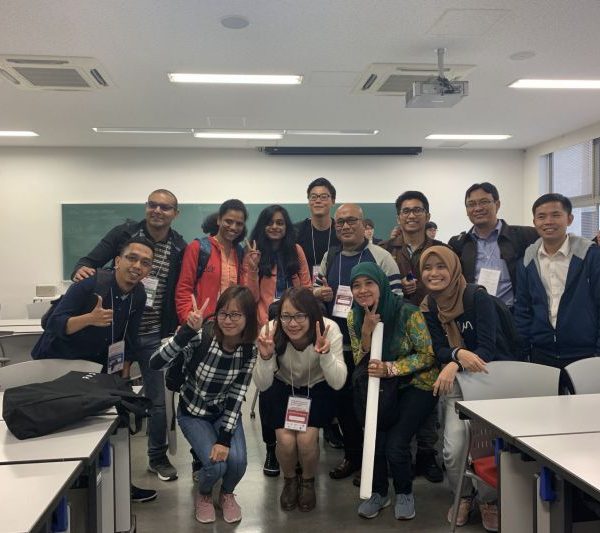
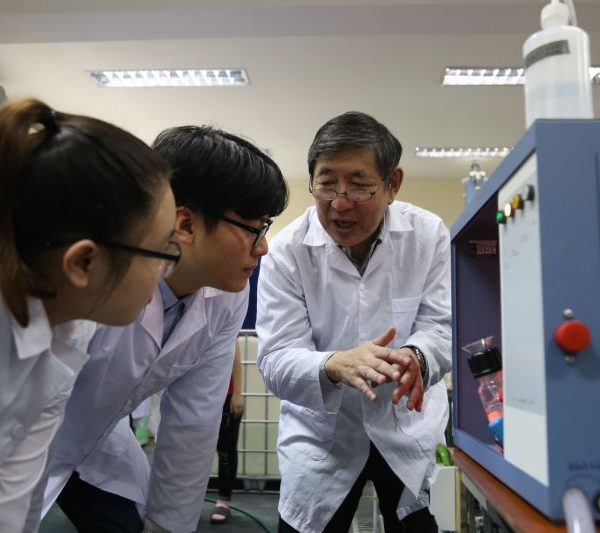
1. Training objectives
a. General Objectives
The Master’s Program in Environmental Engineering provides, enhances and updates learners with in-depth expertise knowledge in the field of environmental technology and engineering, and the ability to apply specialized knowledge in the practical activities. The program trains learners to become cadres with the ability to think independently and creatively working at environmental treatment stations/ plants; doing management work in ministries, branches and companies; working as lecturers or scientific researchers in universities and research institutes and as PhD students at domestic and international universities, especially at Japanese universities.
b. Specific training objectives (Program education objectives – PEOs)
– PEO1 – Knowledge: The research-oriented Master’s Program in Environmental Engineering equips and updates for learners the advanced and in-depth knowledge on various aspects in the field of environmental technology and engineering, initially orients research for students through master thesis.
– PEO2 – Skills: The program provides learners with professional skills related to analysis, assessment, design, processing, environmental forecasting, as well as soft skills to support their research and work process.
– PEO 3 – Ethics: The training program helps learners practice and promote personal, professional and social ethical qualities, including: Enthusiasm, sense of discipline, motivation, and high adaptability multicultural environment and new circumstances, respecting cultural diversity. Have high responsibility for work, be ready to cope with difficulties and pressure at work, be able to work independently and in groups, lead professional groups, be passionate, honest, creative in research research, adhere to research ethics, have a desire to apply what have learnt to solve practical environmental problems. Show the right awareness of environmental protection, have high responsibility towards society, and comply with the law.
– PEO4 – The program provides society with high-quality human resources in environmental research, monitoring, management and treatment, meeting the entry requirements of doctoral training programs at prestigious universities in the world, especially Japanese universities; and meeting requirements of domestic and foreign agencies, organizations and enterprises, especially Japanese enterprises in Vietnam.
- Duration: 02 years
- Forms of training: Full-time training with flexible schedule.
- Degree's name:
- Vietnamese: Thạc sĩ chuyên ngành Kĩ thuật môi trường
- English: The Degree of Master in Environmental Engineering
- Training language: The training program is taught in English except for 2 follwing courses: Philosophy (in Vietnamese), Japanese (in Vietnamese and Japanese). The master thesis is written and defended in English.
- Traning location: My Dinh campus and Hoa Lac campus of VNU Vietnam Japan University
Expected job positions
Graduates of the Master’ Program in Environmental Engineering can take up the following positions:
– Learners can work as specialists, experts or managers and operators at environmental treatment stations/plants, foreign-invested companies or environmental protection funds, non-governmental organizations … with professional work relevant to the environment.
– Researchers or lecturers at research centers, institutes, universities, colleges or other educational institutions with the training program of the environmental science;
– Become an environmental manager in state agencies and enterprises.
– Ph.D. in leading universities in several countries
Program Advantages
– High-quality lectures delivered by excellent Professors and Lecturers from Vietnam and Japan in all courses.
– Many opportunities for participating in collaborative research projects with excellent Professors and Lecturers from Vietnam and Japan.
– Modern laboratories equipped with advanced analysis instruments.
– Enthusiastic support from MEE faculties.
– Full/partial scholarship every semester and internship activities in Japan for qualified students.
– Competitive advantage in seeking future career opportunities.
– MEE has been assessed and recognized to satisfy the requirements of the ASEAN UNIVERSITY NETWORK QUALITY ASSURANCE STANDARD (AUN-QA).
University Co-coordinates
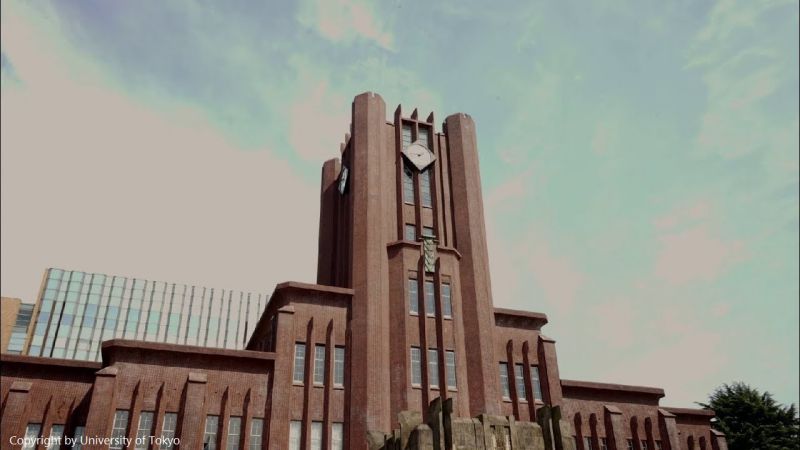
Tokyo University
University of Tokyo, partner university of the Master of Area Studies program. This is the most prestigious university in Japan, ranked 36th in the world in 2020 according to The Times Higher Education World University Rangkings
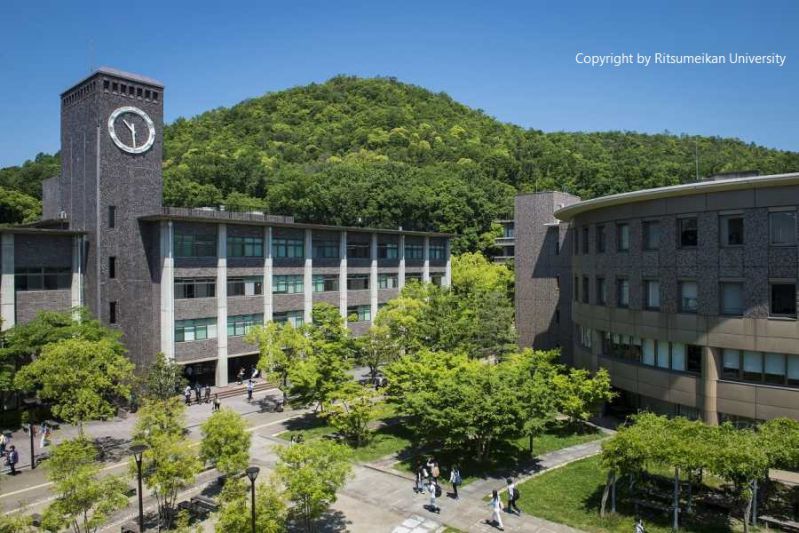
Ritsumeikan University
Ritsumeikan University is one of the finest Japanese private universities, especially in terms of education and research quality.
Program Message
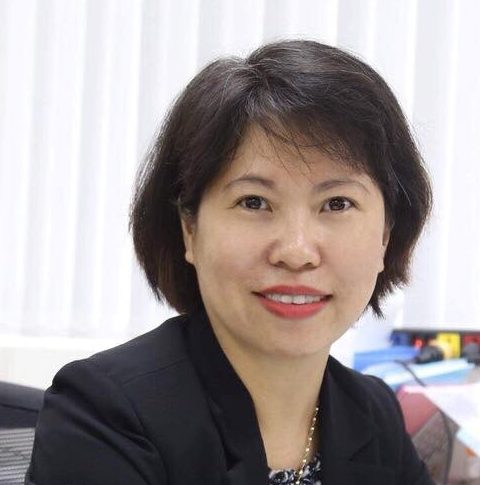
Dr. Nguyen Thi An hang
Program director
The Master’s program in Environmental Engineering (MEE) at Vietnam Japan University, VNU, Ha Noi, offers attractive lectures on environmental technologies and their practical applications. You will also experience excellent practice and internship activities in Japan and Vietnam. Moreover, as MEE’s students, you can join in doing research projects with the leading Japanese and Vietnamese professors. This is an excellent opportunity for you to develop your research capacity, become a co-author of high-quality publications in prestigious peer-reviewed journals, and be sponsored to attend national and international scientific conferences. These are essentials for those who wish to pursue PhD study after graduation. We strongly support you in career orientation with helpful information on Japanese employers. With an advanced learning curriculum and bright career opportunities, MEE at VJU can be a master choice for your future.
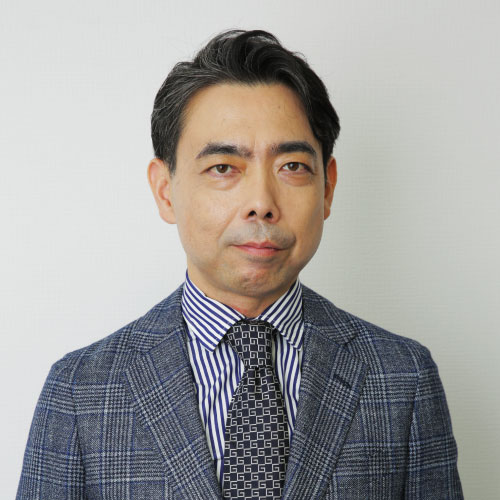
Prof. Hiroyuki Katayama
Program co-director
Faculty members from the Department of Urban Engineering, Graduate School of Engineering, The University of Tokyo will actively participate in the Master’s Program in Environmental Engineering at the Vietnam -Japan University. In particular, we are aware of the role that environmental engineering plays in global trends, including sustainable development goals, and we will provide cutting-edge technologies and knowledge in the research fields. We also intend to prepare field exercise programs that include the active participation of students of the University of Tokyo. The Vietnam-Japan University has a recommendation quota by the Japanese Embassy, and up to now, about three students each year have been supported to study in Japan for doctoral courses. We welcome all ambitious students.
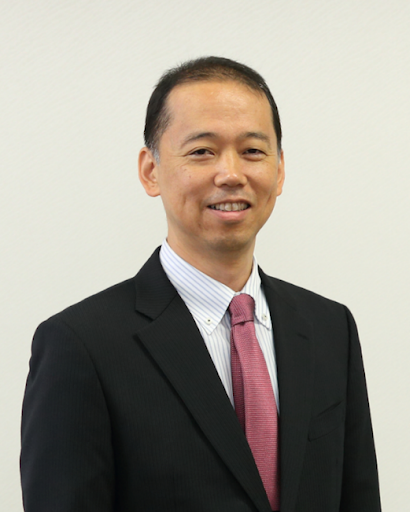
Prof. Hashimoto Seiji
Program co-director
MEE is one of the master programs in VJU that most powerfully promotes research activities and aims for VJU to be a Strong Research University. The lectures on environmental engineering are attractive to famous Vietnamese and Japanese professors, including theoretical and practical content. The MEE students also have joined in the internship in Japan and the field trip in Vietnam. Environmental engineering aims to solve global or local environmental issues in the world. The research topics are widespread in water resources, air pollution, solid waste, wastewater, biodiversity, chemicals, energy saving, material recycling, etc. They are all carried out for human happiness and environmental protection worldwide. Please join MEE to understand the attractive joy and valuable task of research activities. In addition, after completing MEE study, many students continue their research in Ph.D. programs worldwide on scholarships.
Program curriculum
Learnign outcome
1. Knowledge expected learning outcomes
1.1. General knowledge
- PLO1. Apply basic knowledge and methodology of Marxist – Leninist philosophy to solve general and professional problems.
- PLO2. Have the minimum English proficiency certificate at 4/6 level according to the 6-level foreign language capacity framework for Vietnam or equivalent.
II.1.2. Fundamental and specialized knowledge
- PLO3. Analyze comprehensive knowledge of the law, environmental management, environmental protection, and sustainable development.
- PLO4. Develop research methods in the field of environment (assessment, control, management, handling of environmental problems) to solve practial environmental issues.
- PLO5. Apply the specialised knowledge of Chemistry, Physics, Biology, Sustainability Science, and Technology in environmental treatment processes including recovery and regeneration of waste resources; typical technologies in the treatment of supply water, wastewater, solid waste, and exhaust gases in environmental treatment systems.
- PLO6. Evaluate procedures for environmental assessment, analysis, monitoring, and prediction.
- PLO7. Evaluate environmental pollution and select appropriate technology and management solutions to solve the environmental problems.
II.2. Skills expected learning outcomes
II.2.1. Professional skills
- PLO8. Apply laboratory skills, environmental analysis, and monitoring procedures; operate advanced analytical equipment, environmental management and simulation software.
- PLO9. Design basic environmental treatment units.
- PLO10. Identify the research problems, and develop research plans to solve practical issues in the field of environmental engineering.
- PLO11. Exploit, classify, process, and evaluate the specialized information on environmental engineering (both Vietnamese and English).
II.2.2. Supplementary skills
- PLO12. Have an ability for verbal and written communication, self-study, planning, time management, independent and teamwork, conflict management and resolution, group leading, mobilizing collective intelligence to solve environmental problems, making decisions, and starting up the business.
- PLO13. Have independent, logical, critical thinking in daily life and professional work, and creative ability.
- PLO14. Master office software and data analysis skills in professional careers.
- PLO15. Demonstrate ability to communicate in the Japanese language.
II.3. Autonomy and responsibilities expected learning outcomes
II.3.1. Personal autonomy and responsibilities
- PLO16. Have enthusiasm, discipline, motivation, high adaptability to multicultural environments and new circumstances, and respect for cultural diversity.
II.3.2. Professional autonomy and responsibilities
- PLO17. Demonstrate high responsibility for work, be ready to cope with difficulties and pressure at work, be able to work independently and in groups, lead professional groups, show passion, honesty, and creativity in research, abide research ethics, have the desire to apply what have learned to solve practical environmental problems, and contribute to developing work conducts.
II.3.3. Social autonomy and responsibilities
- PLO18. Demonstrate the right awareness of environmental protection, have high responsibility towards society, and strictly comply with the law.
Admissions
1. Admission methods
– Direct offer
– Interviews and review of applications.
Admission information according to the Admission regulations, the Annual graduate admission guidelines of VNU, and the Admission plan of VNU-VJU approved by VNU (if any).
2. Admission requirements
– Degree: Having a university degree in the correct major and appropriate major .
– Work experience:
- Applicants are required to have GPA≥ 2.5/4.0.
- In case Applicants takes the university graduation exam with GPA < 2.5/4.0, the Admissions Council will consider and decide based on work experience.
– Foreign language proficiency: applicant must possess an English language proficiency that meets one of the following requirements:
- To use a foreign language certificate, candidates must meet the following requirements: Holding a valid English certificate within 2 years from the exam date to the date of submission and was issued by an institution recognized by MONRE, VNU. At the time of application, Applicants must have an English proficiency equivalent to level 3/6 (B1). Before taking specialized courses, students must submit proof of English proficiency equivalent to level 4/6 (B2).
- To use a diploma for taking place of foreign language certificate, candidates must have one of the following types of diplomas:
- Bachelor’s degree or higher in English language, English language pedagogy or bachelor’s degree or higher in which basic and specialized courses are conducted in English.
- University degree or higher issued by training units in VNU within no more than 2 years from the date of application, provided that candidates use a foreign language certificate (all 4 skills) to consider and recognize university graduation (foreign language certificate is attached to the application).
3. List of correct major, appropriate majors of the proposed training program
– The correct major: Environmental technology engineering
– The appropriate majors:
- The appropriate majors (without supplementary study requirement): Chemical engineering technology, Environmental engineering, Environmental science, Water resource engineering.
- The appropriate majors (with supplementary study requirement): Applicants graduated from other majors in the fields of Engineering Technology (Group of Architectural and Construction Engineering Technology, Chemical Technology, Materials, Metallurgy and Environment), Engineering (Group of majors) Chemical, materials, metallurgical and environmental engineering, Geological, geophysical and geodetic engineering, Mining engineering), Architecture and construction, Natural sciences; majors in the fields of Life Sciences, Health (Pharmacy, Public Health), Agriculture, Forestry and Fisheries, Environment and environmental protection, Production and processing, Peach creating teachers (physics pedagogy, chemistry pedagogy, biology pedagogy, industrial engineering pedagogy, agricultural engineering pedagogy, technology pedagogy, natural science pedagogy); highly interdisciplinary industries; Training courses abroad will be considered and decided by the Admissions Council based on the application documents.
4. List of supplementary courses needed for closely related majors
| No | Name of Course | Credit |
|---|---|---|
| 1 | Fundamental environmental technology | 3 |
| 5 | Environmental microbiology | 3 |
| Total credits | 6 | |
5. Estimated enrollment quota:
- 10 students/batch
Contact
Program Office
P.506, 5th floor, Vietnam Japan University, Luu Huu Phuoc Street, My Dinh 1 Urban Area, Nam Tu Liem District, Hanoi
– Program Director: Dr. Nguyen Thi An Hang, email: nta.hang@vju.ac.vn
– Program Coordinator: Dr. Tran Thi Viet Ha, email: ttv.ha@vju.ac.vn
– Facuty assisstant in charge: MSc. Nguyen Thi Hong Nhung, email: nth.nhung@vju.ac.vn

